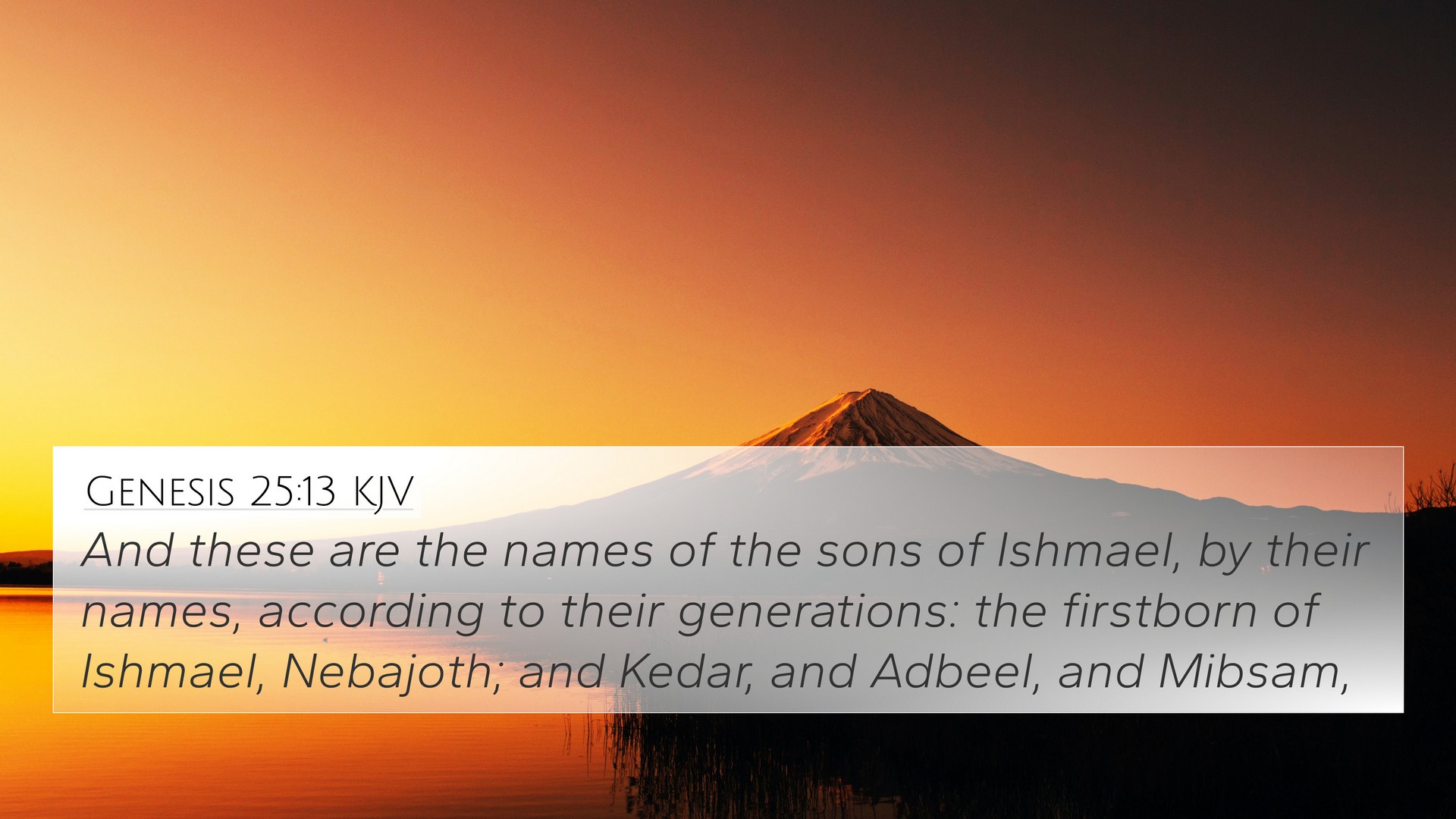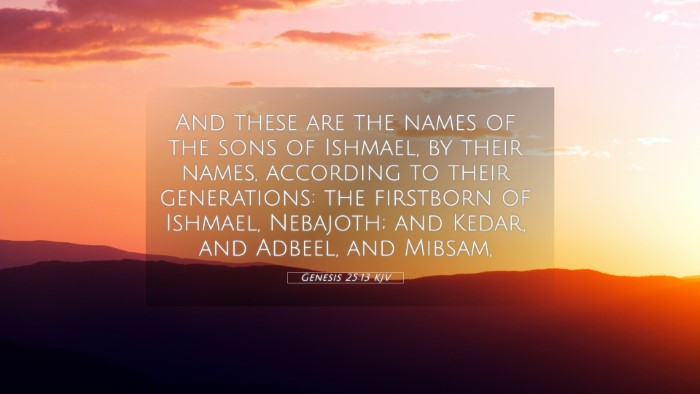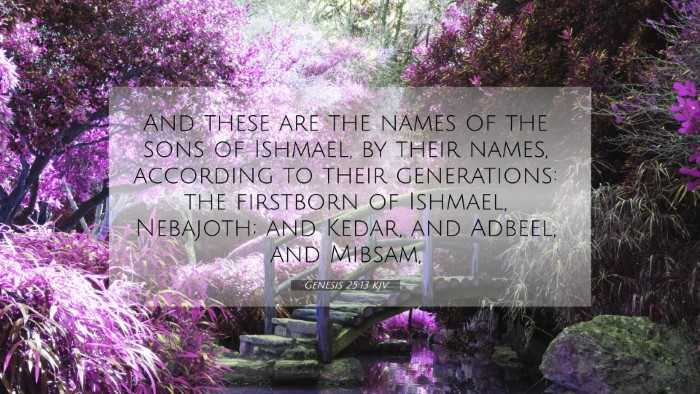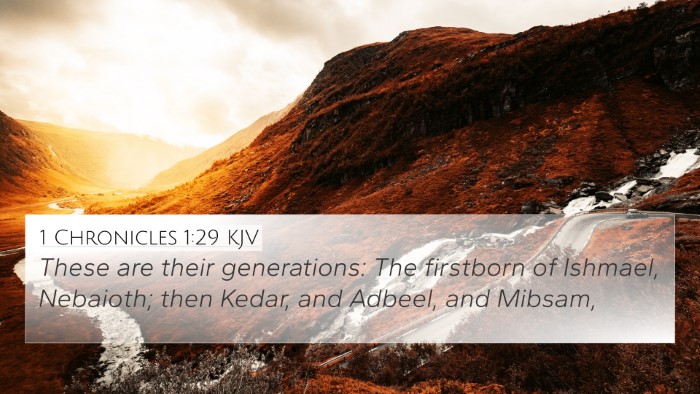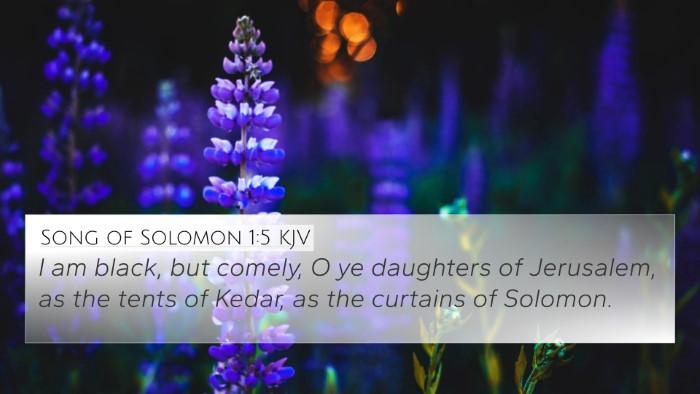Meaning and Interpretation of Genesis 25:13
Genesis 25:13 states, "And these are the names of the children of Ishmael, by their names, according to their generations: the firstborn of Ishmael, Nebajoth; and Kedar, and Adbeel, and Mibsam." This verse presents a genealogical record of Ishmael, highlighting not only his lineage but also establishing his significance within the broader narrative of the Bible, particularly relating to the promises made to Abraham.
Summary of Commentary Insights
This section summarizes insights from noted public domain commentaries by Matthew Henry, Albert Barnes, and Adam Clarke regarding Genesis 25:13.
Matthew Henry's Commentary
Matthew Henry emphasizes the importance of genealogies in the Bible as a means to understand God’s covenantal promises. He notes that Ishmael's descendants, though distinct from Isaac's line, still have a significant role in God's plan. The names listed (Nebajoth, Kedar, Adbeel, Mibsam) not only represent individuals but entire tribes that arose from Ishmael. Henry points out this illustrates the fulfillment of God's promise to Abraham regarding his seed.
Albert Barnes' Commentary
Albert Barnes elaborates on the implications of the names mentioned, connecting them to historical contexts and the future nations that emerged from Ishmael's lineage. He describes how these tribes settled in the region to the south of Israel and became known for their nomadic lifestyle. Barnes connects this back to the broader theme of God's providential care and the unfolding of His plans for different peoples, which would also later lead to the emergence of various nations influenced by the descendants of Ishmael.
Adam Clarke's Commentary
Adam Clarke gives a more detailed analysis of the linguistic roots of the names listed in Genesis 25:13, providing insights into their meanings and how they reflect the characteristics of the tribes. Clarke underscores the importance of recognizing these links as they reveal God's overarching sovereignty and the interconnectedness of different cultures within the biblical narrative.
Cross-References for Genesis 25:13
- Genesis 16:10-12 - God's promise to Hagar regarding Ishmael's future.
- Genesis 21:17-21 - The divine re-affirmation of God’s provision for Ishmael after his banishment.
- Galatians 4:22-31 - A theological reflection on the two covenants represented by Isaac and Ishmael.
- Jeremiah 49:28-32 - The prophetic words concerning the tribes descended from Ishmael.
- Isaiah 60:7 - A future promise concerning the descendants of Kedar.
- Matthew 1:2-16 - A genealogy highlighting the significance of Abraham’s lineage.
- Romans 9:7-8 - The discussion of children of promise versus children of the flesh.
Thematic Connections in Scripture
Genesis 25:13 is integral in understanding themes of divine promise, lineage, and covenants within the biblical narrative. The names of Ishmael's children serve not only to document genealogy but also to illustrate how God's plans encompass different nations and lineages.
Inter-Biblical Dialogue
This verse invites readers to explore the broader connections between the Old and New Testament, recognizing how God's covenant with Abraham extended beyond Isaac to Ishmael, thus displaying His mercy and sovereignty over all humanity. The descendants of Ishmael played a crucial role in the spread of cultures and nations that interacted with Israel throughout biblical history.
Tools for Bible Cross-Referencing
To delve deeper into the complexities of Genesis 25:13 and its related verses, utilizing biblio tools for cross-referencing is recommended. These include:
- Bible concordance - A fundamental reference tool for locating verses and understanding their contextual meanings.
- Bible cross-reference guide - Helpful for identifying thematic connections within scripture.
- Cross-reference Bible study - Methods to connect related verses systematically.
Conclusion
Genesis 25:13 serves as a vital link in the narratives of the Bible, influencing our understanding of Ishmael's role in the continuation of God's plan for humanity. By employing comparative analysis with various biblical texts, readers can grasp the significance of interconnected stories throughout scripture.
